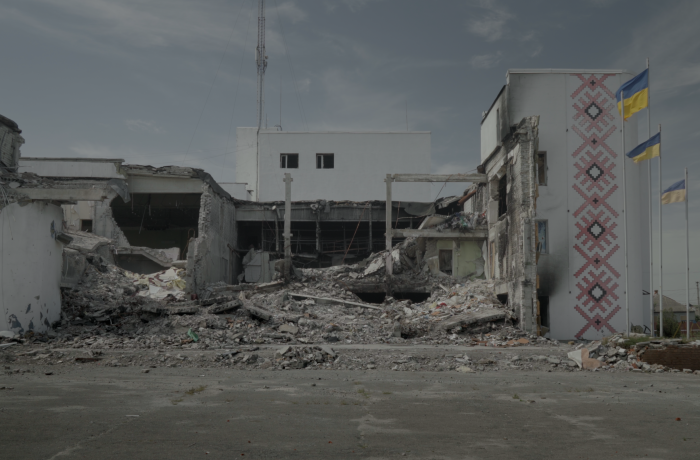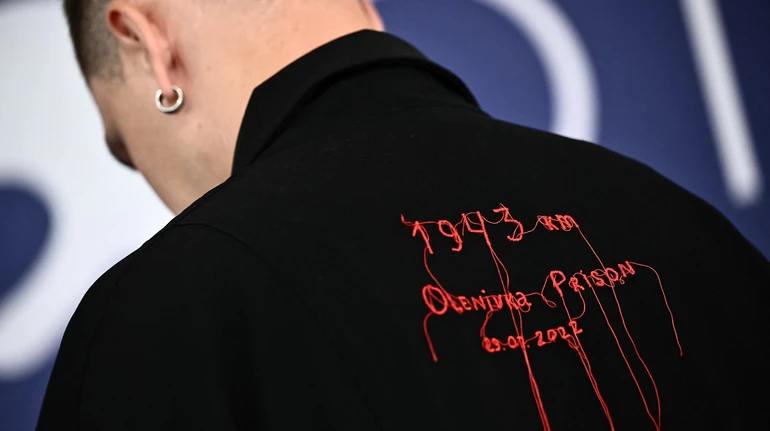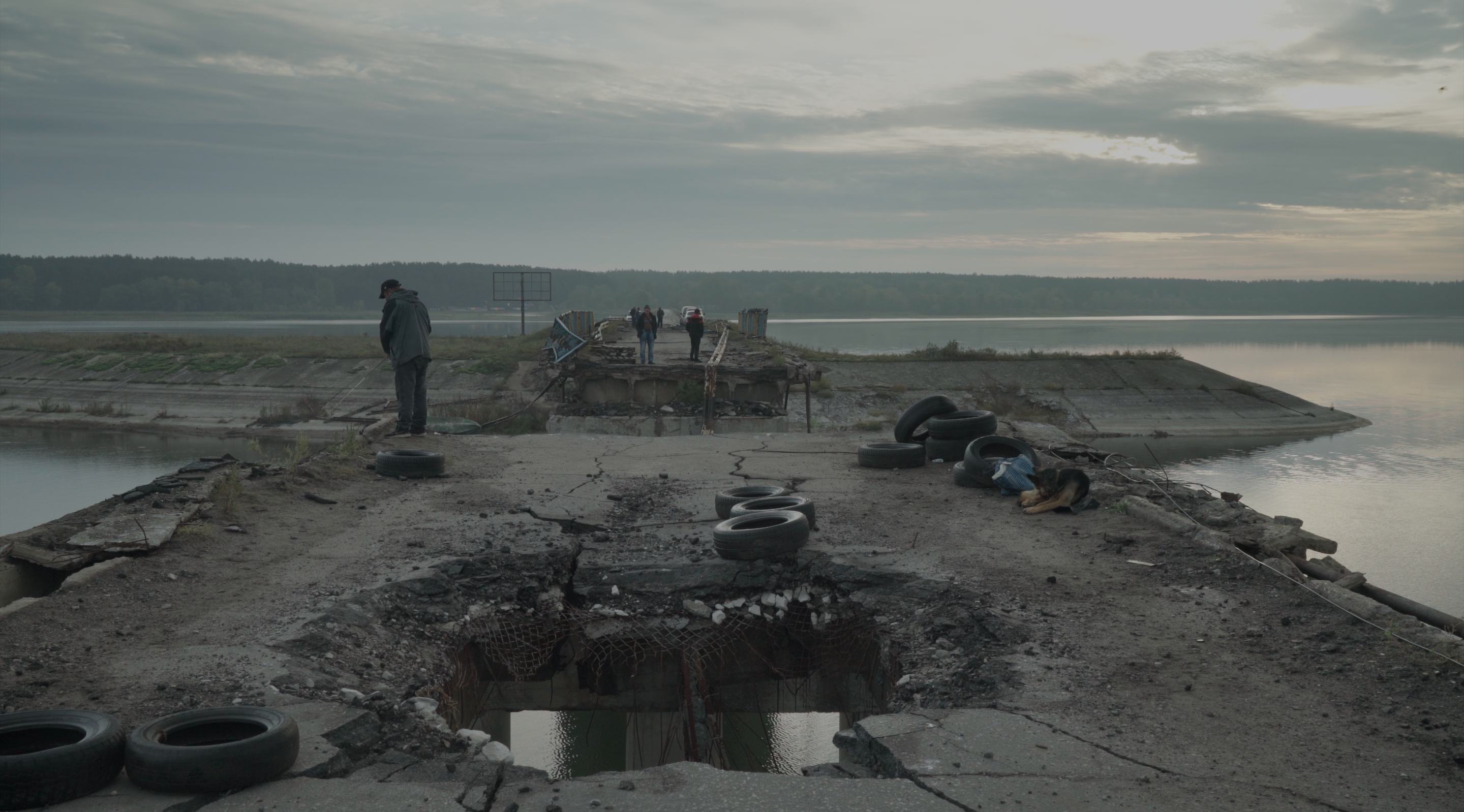
The Docudays UA team expresses its disappointment about the documentary Russians at War by Russian director Anastasiya Trofimova screened on 5 September at the 81st Venice International Film Festival. In this article, we quote film critics who comment on the film and argue why this work serves as a tool of Russian propaganda and should not be shown at international film festivals. In particular, at the Toronto International Film Festival (TIFF), which announced the film in its documentary programme.
The film critic Sonya Vseliubska had the opportunity to watch the film at the Venice Film Festival and shared her opinion frankly:
"I have attended a lot of international festivals over the past year, and unfortunately, the kind of programme template we saw in Venice is a frequent occurrence. Putting two films from countries at war in the same section is just a lazy programming methodology (note: we sincerely hope that this unfortunate incident did not happen on purpose).
But the situation with the film by Zhurba and Trofimova (note: Ukrainian and Russian directors) has reached a climax. Russians at War interprets a propaganda narrative in which the Russian military is humanised, and this sympathy is directed at the poor conditions of their service and nothing else.
Since the festival's programmers used to let 'good' Russian works in, at some point the boundaries of what was allowed started to blur, and now we see a film in the Venice programme from a person who supports entirely pro-Russian narratives.
But even worse is the realisation that this documentary was not chosen for its outstanding artistic qualities, but simply as a speculative thematic juxtaposition. Needless to say, the artistic and technical qualities of Russians at War are on the lowest levels of low-brow YouTube videos.
At the same time, I sincerely believe that our documentary cinema is the most powerful on the festival scene today, and it is able to withstand such crises in festival competitions with dignity. Because the ethical, artistic and, finally, political power of Ukrainian documentary cinema is only growing."
A photo of the protagonist of the film Songs of Slow Burning Earth, soldier Mykola Hradnov-Savytskyi, on the red carpet in Venice. Author: Marco Bertorello / AFP Via Getty Images.
The Ukrainian perspective was indeed represented in the Venice Film Festival programme and received a warm response from the audience. The director Olha Zhurba, together with producer Daria Bassel and the heroes and heroines, presented the documentary story 'Songs of Slow Burning Earth'. At the red carpet event, the team drew attention to the Ukrainian prisoners imprisoned by Russia.
At the press conference of the Venice Film Festival, the Ukrainian director expressed her opinion when asked about the Russian film in the programme:
"If the 'Russian opposition' wanted to stop the war with this film, they chose the wrong way. Could you imagine, for example, Denmark making a film about a 'human side' of the German army during the Second World War? Because you can find a 'human side' in every person, even in a serial killer. But could you imagine this film in these times? When everyone knows about the genocide that covered all Europe…
…I believe that the Russian opposition and these Russian soldiers have already broken the law. The director filmed the characters on our territories, which were occupied, and thus, they violated international humanitarian law...
…But I believe we need, just like the whole world, to be united in our position to bring all war criminals to the court. We already know who these people are, and all international organisations also know about them. This is not the time to evoke sympathy for Russian soldiers, because they continue to occupy us, to fire missiles at populated areas, and the director will not show this in the film. I think this is the wrong direction, and Russian artists and filmmakers should be brave enough to be criticised and show the true face of this criminal terrorist state"
Having watched the film Russians at War, Daria Bassel could not stand aside either and spoke out in her Facebook post, which gathered a large number of reactions, opinions from the film community and the media. We quote it in part:
“I watched a film today at the Venice Film Festival titled Russians at War. Since our film is in the same section as this one, I usually wouldn’t speak publicly about it. However, in this case, I cannot remain silent, because it’s not just about films and art, but about the lives of thousands of people who die in this war — a war that has instrumentalized propaganda as its weapon.
This film may mislead you into believing that it is an anti-war film, one that questions the current regime in Russia. However, what I witnessed is a prime example of pure Russian propaganda. Here’s why.
The filmmaker begins by expressing her surprise at the Russian invasion of Ukraine in 2022. In her film, she always uses the term 'invasion' and never 'full-scale invasion.' She does not mention that Russia invaded Ukraine and annexed Crimea in 2014. These two events seem to not exist in the world of this film. The filmmaker also states that her country hasn’t participated in wars for many years and that she has only read about wars in books. Thus, the war in 2022 was a complete shock for her. It’s interesting how the filmmaker could overlook the fact that her country has been inherently involved in various wars and occupations for at least the last 30 years (1992-93 Transnistria, Abkhazian War, 1994-96 and 1999-2009 Chechen Wars, the 2008 war in Georgia, and the 2015-2022 invasion of Syria).
The filmmaker starts her narrative with a Ukrainian who now lives in Russia and fights on the Russian side. This is a very intriguing choice for the beginning of a story about Russians at war. Later, this character will claim that a CIVIL war began in Ukraine in 2014. He will also suggest that Ukrainians bombed the eastern parts of their own country (and this is why he moved to Russia). Another character will declare that Ukrainians are Nazis. We’ve heard these narratives before; they are (and apparently still are) widely and actively propagated by Russian media. One of those horns of propaganda is Russia Today channel, for which the director of Russians at War has previously made several documentary films.
Throughout the film, all characters express their confusion about their actions in Ukraine, stating they want the war to end and that most of them are fighting for money. In the final part of the film, the battalion is moved to Bakhmut, and most characters die in battle. We then see their comrades and relatives grieving at their graves. All of them repeat that they don’t understand why this war is happening and who needs it. In the end, the filmmaker concludes that these are poor, ordinary Russian people who are being manipulated into war by larger political games. I found this perspective amusing because the filmmaker—like putin and his regime—plays an interesting game with these people. They deny them the simple ability to possess dignity and to think and decide for themselves. To her, these people are merely powerless objects. If those engaged in a war that has lasted over 10 years were not powerless, it would imply that they, in the majority, actually support this war, wouldn’t it?
You will feel pity for the people depicted as dying in the film and for those we see crying for their loved ones. And you should — if you are a normal human being, you should feel pity, sadness, and emotion. However, it is also important to remember that these individuals joined the army that invaded an independent country, many of them willingly, as we learn from the film. You should also recall Bucha, Irpin, Mariupol, and the civilians who were murdered there. Remember the thousands of children who were illegally transported from Ukraine to Russia. While I’m writing this and while you’re reading it, missiles are striking Ukrainian cities. The buttons are pushed by ordinary Russians. Are their crimes any less significant simply because they claim to be unaware of why they are involved in this war?
By the way, the director asks one of the characters if he thinks the Russian army commits any war crimes. He answers 'no,' claiming he hasn’t witnessed any war crimes. Interestingly, the director echoes this in her interviews, stating she saw no signs of war crimes during her time near the front. We can only be happy for her that she was fortunate enough not to witness any war crimes. Unfortunately, thousands of Ukrainians have not been so lucky.
I could continue, but I believe it’s enough to understand that this film presents a very distorted picture of reality, spreading false narratives (calling the Russian invasion and annexation of Crimea a civil war; suggesting that the Russian army does not commit any war crimes; presenting those who are part of the aggressors army as victims)...”
Producer Oleksandra Kravchenko shared an important observation while commenting on the post:
“It’s also quite eye opening to compare your review with the text accompanying the film on the website of TIFF which suggests that the film is ´a spellbinding tale of sacrifice and disillusionment’ and also that the director worked in many war zones including Syria (of Russia’s involvement in which she apparently knew nothing about).”
Thus, we would like to emphasise that the film Russians at War does not address or completely ignore the fact that this war has been going on for 10 years, not 2, since the Russian occupation of Crimea, which the International Criminal Court report calls an 'international armed conflict', and not a civil war, as the film portrays. All these years after the collapse of the Soviet empire, Russia has been at war — in Chechnya, Moldova, Georgia, Syria — and it is impossible to ignore it. Finally, war crimes are a conscious policy of the Russian state. Given the narratives of the film and the experience of its author working with Russian media, we believe it is important to address the international film community, programmers and festival directors with a warning against further screenings of Russians at War at your venues. This film distorts knowledge about the ongoing war that continues to claim the lives of civilians in an independent democratic state.
Photo: stills from the documentary Intercepted by Oksana Karpovych, images of the consequences of Russians' actions at war.